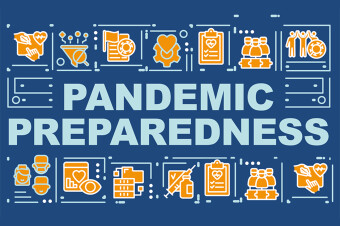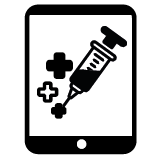Challenges
 Infectious diseases are a major cause of death worldwide, particularly in low and middle-income countries. Some examples of infectious diseases include HIV, tuberculosis, influenza, measles and neglected tropical diseases. They spread among humans and lead to epidemics with major impacts on society, often disproportionately affecting women, girls, and vulnerable groups. More recently, the exposure to pandemics has been fostered by increased human mobility, proving how interconnected and interdependent countries are in the context of globalization. To minimize transmission, countries around the world have established national surveillance systems, using epidemiological data and a range of other information sources from different sectors and disciplines. This is meant to detect, confirm and report epidemics as early as possible, and to ensure timely and appropriate public health action.
Infectious diseases are a major cause of death worldwide, particularly in low and middle-income countries. Some examples of infectious diseases include HIV, tuberculosis, influenza, measles and neglected tropical diseases. They spread among humans and lead to epidemics with major impacts on society, often disproportionately affecting women, girls, and vulnerable groups. More recently, the exposure to pandemics has been fostered by increased human mobility, proving how interconnected and interdependent countries are in the context of globalization. To minimize transmission, countries around the world have established national surveillance systems, using epidemiological data and a range of other information sources from different sectors and disciplines. This is meant to detect, confirm and report epidemics as early as possible, and to ensure timely and appropriate public health action.
However, the control and eradication of infectious diseases face many challenges, including emerging and re-emerging diseases due to climate change and the destruction of biodiversity. The potential introduction of infectious agents by bioterrorists, and an increasing resistance of pathogens to current antimicrobial drugs constitute additional challenges.
GFA concept and services
 To address these challenges and contribute to achieving the Sustainable Development Goal 3, GFA promotes an integrated and coordinated approach to infectious disease prevention and control as well as pandemic prevention and response.
To address these challenges and contribute to achieving the Sustainable Development Goal 3, GFA promotes an integrated and coordinated approach to infectious disease prevention and control as well as pandemic prevention and response.
Related services comprise the development of comprehensive epidemiological surveillance systems through technical assistance. Over the past decade, expert teams have improved data and information management, laboratory infrastructure, sample transport management, policy and standards development, human and finance resources management, medical emergency systems, and research in several countries. GFA’s multi-sectoral setup allows leveraging knowledge from key sectors such as agriculture, water and sanitation, and natural resources management and environment. Thereby better address all kinds of infectious diseases and threats such as virus- and water-borne diseases, zoonotic diseases, and antimicrobial resistance in line with the One Health approach based on the understanding that there are close links between the health of humans, animals and the environment.
GFA’s expertise in digital solutions opens additional opportunities to use new technologies, epidemic intelligence applications, digital pandemic preparedness and e-learning to help countries deal with epidemics more efficiently.
Photo on top: Orbon Alija | istockphoto
Contact
 Eva Schildbach
Eva Schildbach
Director Health Department
E-mail: eva.schildbach[at]gfa-group.de






